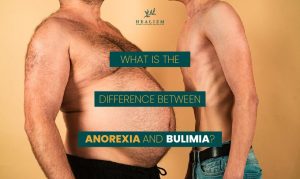
Anorexia and bulimia are eating disorders. They can exhibit comparable symptoms, like distorted body image. They do, however, exhibit distinct food-related behaviors.
For example, people with anorexia severely restrict their food intake to lose weight.
People living with bulimia consume an excessive amount of food in a short period before purging or using other techniques to avoid weight gain.
Although eating disorders are not age or gender-specific, they impact women more than men.
According to the National Association of Anorexia Nervosa and Associated Disorders, around one percent of all American women will acquire anorexia, and 1.5 percent will develop bulimia.
What Is Anorexia Nervosa?
Anorexia nervosa causes people to restrict their food intake, avoid certain meals, or eat small amounts of them.
People with anorexia are also more likely to weigh themselves frequently, keeping track of their weight.
Such sort of people often think of themselves as overweight, even if they are normal or dangerously underweight.
Symptoms of Anorexia Nervosa
Numerous emotional, behavioral, and physical indicators can indicate anorexia.
Physical symptoms may be severe and life-threatening.
Symptoms of extreme weight loss may include:
- Sleeplessness
- Thirst
- Constipation
- Weakness
- Exhaustion
- Dizziness
- Hair loss
- Blue fingers
- Dry, yellowish skin
Psychological symptoms can be:
- Distorted body image
- Intense fear of gaining weight
- Relentless chase for being thin
Contact us to get more information and support.
What Is Bulimia Nervosa?
Bulimia nervosa, often known as bulimia, is a severe eating illness with potentially fatal consequences.
Those who have bulimia frequently engage in hidden binge-eating episodes characterized by a sense of loss of control while eating vast amounts of food.
Following a binge, people may engage in purging practices in an attempt to rid themselves of the excess calories and avoid weight gain.
Symptoms of Bulimia Nervosa
Common symptoms of bulimia in adolescents may include:
- Consuming an excessive amount of food in a short period frequently (binge eating)
- Secretive eating or disappearance of large amounts of food
- Frequent trips to the bathroom immediately following meals
- Expressions of guilt or shame about eating
- Evidence of vomiting or laxative use
- Intense fear of weight gain
- Low self-esteem
Causes of Eating Disorder
It is unclear what causes anorexia and bulimia to develop.
Many professionals feel it could be the result of a complicated combination of biological, psychological, and environmental variables.
This includes:
1. Genetics
Suppose your family member has an eating disorder; it may increase your risk of developing one.
It can arise due to heredity and passes from one generation to another. More research is needed to discover whether there is a natural genetic relationship.
2. Emotional Well-Being
Those people who face depression and anxiety have more chances to have the issue of eating disorders.
These have have irregular sleep as well as eating patterns. Thus, stress and low confidence can also lead to eating disorders.
3. Social Pressures
The present western ideal of body image, self-worth, and success are synonymous with thinness and people can feel the urge to obtain this body type.
Pressure from the media and peers may exacerbate this situation.
Additional Resources:
Bulimia vs. Anorexia
Although the two eating disorders share commonalities, there are significant variances.
People with anorexia would follow extreme diets or restrict their food intake to reduce weight.
People living with bulimia binge eat and then purge to reduce weight.
Physical symptoms can differ between anorexia and bulimia. Both can cause weight loss, missed periods, dizziness, and gastrointestinal difficulties.
Bulimia’s physical symptoms frequently include dental problems caused by stomach acid harming the teeth as a result of vomiting.
Final Thoughts
Eating disorders can be managed with a mix of behavioral adjustments, treatment, and medication — recovery is an ongoing process.
Recovery from eating disorders can be challenging since they are inextricably linked to food. Relapsing is conceivable.
Your therapist may suggest maintenance appointments at regular intervals.
If you or anyone you know is going through something similar, please get help.
If you are concerned about your eating habits and do not currently have a mental healthcare physician, reach out at Nahil Psychiatry Services PLLC.
Frequently Asked Questions
What is the opposite of anorexia?
Muscle dysmorphia, often known as bigorexia, is opposed to anorexia. Where people stress over being too little or undeveloped, and they work tirelessly to build muscle bulk.
What are the similarities between anorexia and bulimia?
The symptoms of both illnesses might manifest as behavioral, physical, or both.
Behavioral symptoms include a preoccupation with eating, body size, and dieting.
Being too concerned with one’s physical appearance or weight.
What is the common name for anorexia?
Anorexia nervosa also referred to as just anorexia, is an eating disorder.
